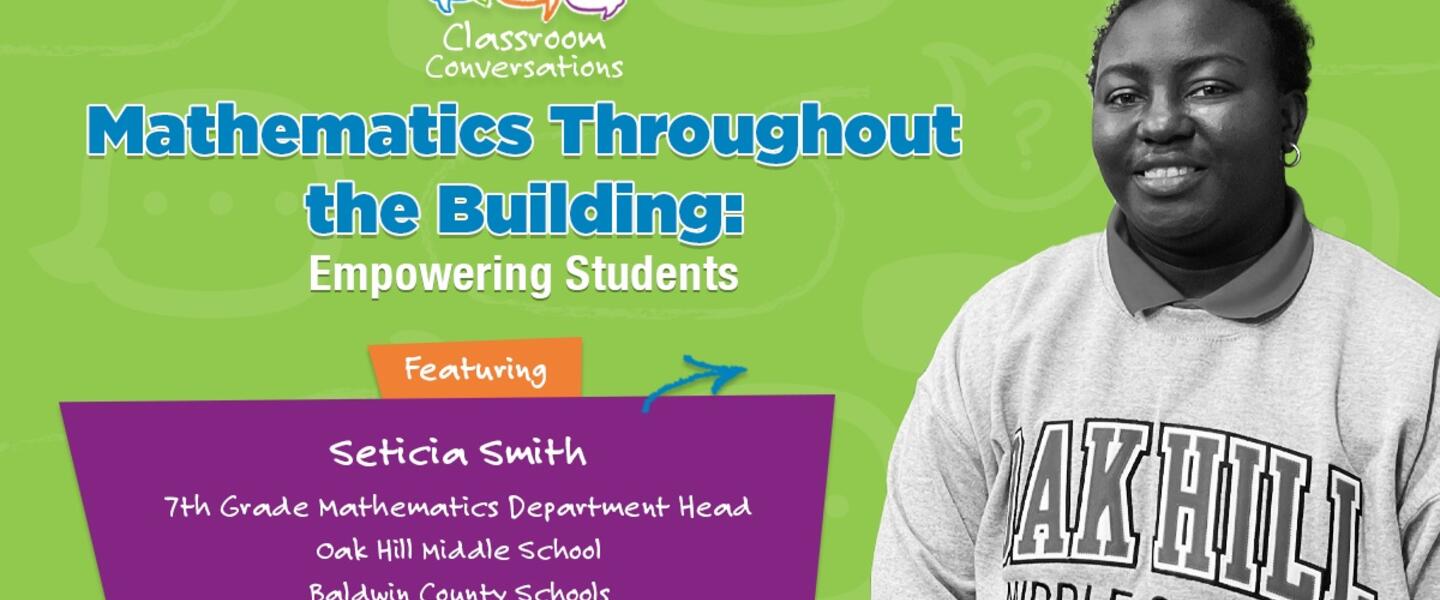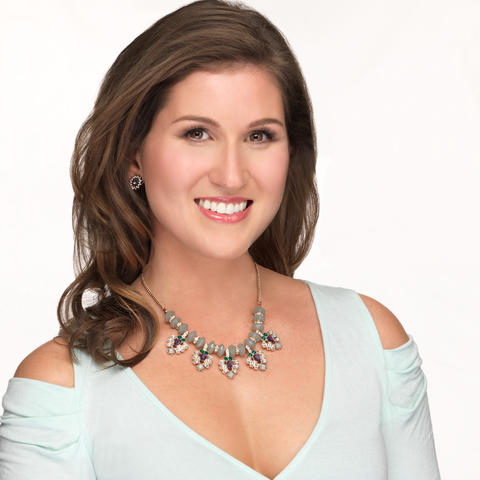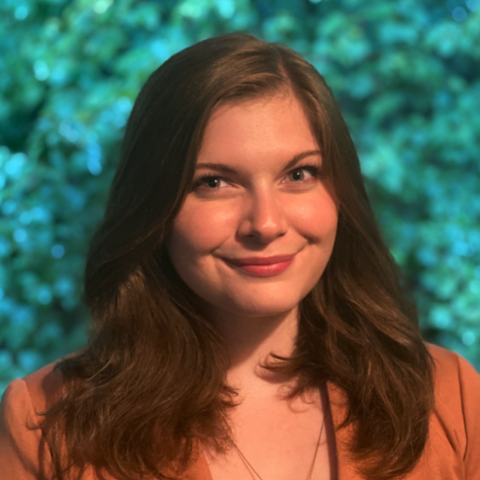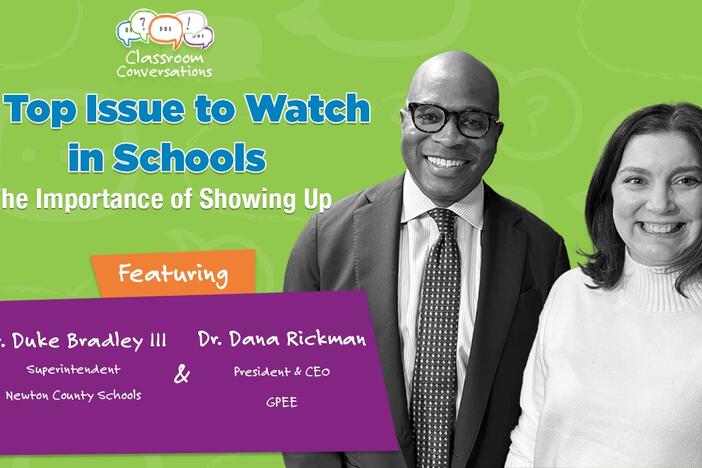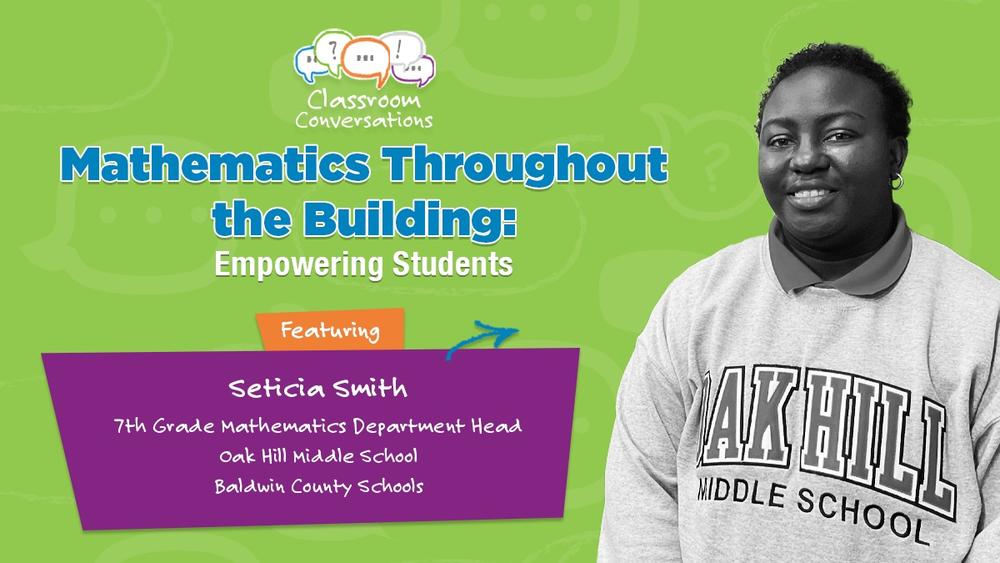
Section Branding
Header Content
Episode 313: Mathematics Throughout the Building: Empowering Students
Primary Content
Let's get students excited about numbers in math class and beyond! Join us in conversation with Seticia Smith of Oak Hill Middle School to learn how.

Let's get students excited about numbers in math class and beyond! Join us in conversation with Seticia Smith of Oak Hill Middle School to learn how.
Click here to watch this episode on YouTube.
TRANSCRIPT
Ashley Mengwasser: Hey, Georgia Educators. We have new discussion guides available to use with Classroom Conversations episodes. These discussion guides include open-ended questions to facilitate great discussion and professional learning after listening to each podcast. Find the new discussion guides posted with the Classroom Conversations episodes and blogs in Georgia Home Classroom. Good day teachers, this is Classroom Conversations. And I'm Ashley Mengwasser, your host. Thank you for joining us on the platform for Georgia's teachers. Classroom Conversations is a place for educators to share and to learn, and we have the Georgia Department of Education and Georgia Public Broadcasting to thank for this enriching podcast series, featuring educator voices from across the state of Georgia. Audience, we need to talk numbers. Our episode today is about engaging mathematics throughout the building and those who do it best know how to engage mathematics throughout life. Of the 365 days in our year, a few are special that we can celebrate in classrooms. Just think about it. October 10th, 10/10, powers of 10 day. September 8. 9.8 anyone? Oh, that's Gravity Day. The acceleration due to gravity on this planet is 9.8 meters per second squared. And what about March 14th? 3.14, Pi Day. Well, on March 14th, 2022, Oak Hill Middle School whipped up a Pi Day so creative, their soiree was highlighted in the local news. There were Pi Day t-shirts. Students tossed whipped cream pies at teachers and they charted their emotions in a circle with school counselors. All was done in support of Oak Hill's seventh grade math teacher and the school's math department chair. My guest today, breast cancer warrior, Seticia Smith. Seticia decided in high school that she wanted to be a math teacher. Anyway, you slice it, she's married to math. Here she is from Milledgeville, Baldwin County School's 2021 to 2022 district Teacher of the Year. Hey Seticia.
Seticia Smith: Hello Ashley.
Ashley Mengwasser: You've accomplished a lot.
Seticia Smith: I know.
Ashley Mengwasser: First thing's first, how are you doing today?
Seticia Smith: I'm doing well.
Ashley Mengwasser: You are?
Seticia Smith: Yeah. So I finished the first week of my radiation this week.
Ashley Mengwasser: Congratulations.
Seticia Smith: One week down, five to go. You talking about numbers?
Ashley Mengwasser: Numbers, it's a big milestone. And I bet that fraction helps keep you going, right?
Seticia Smith: Yes, it does.
Ashley Mengwasser: Because you can see the part of the whole. Tell us a little bit about your health journey since 2021.
Seticia Smith: So, November 2021, I was diagnosed with a heart attack. I guess stress of all the things that I'm doing, came out three days later and then I was announced the Baldwin County School District Teacher of the Year.
Ashley Mengwasser: Congrats.
Seticia Smith: Yes. Went home. Couple of days later I was diagnosed with stage 3B breast cancer.
Ashley Mengwasser: Oh my gosh. And then you've got the radiation.
Seticia Smith: I did chemo treatment first for six months, so I'm just starting radiation now.
Ashley Mengwasser: Okay. So you completed the chemo, you're doing radiation and you're a coach too, right?
Seticia Smith: Yes.
Ashley Mengwasser: What sports, basketball and...
Seticia Smith: Track and field. At one point I was softball, basketball, track.
Ashley Mengwasser: And the toll that that must take on your body already. And then to be going through a health struggle, you are truly admirable,= Seticia. How do you refill yourself? What do you do for self-care, for just rest and rejuvenation?
Seticia Smith: I have to be made to rest.
Ashley Mengwasser: Forced to rest.
Seticia Smith: Yes.
Ashley Mengwasser: Okay, good, we've handcuffed your wrist to the microphone there, so you have to stay calm with us today.
Seticia Smith: Okay. To rejuvenate my body, I actually like being around children. That's why I became a teacher. While I was going through chemo, I was at work three days a week and then I was go have chemo treatment and I rest on Friday and the weekend and go back to work on Monday.
Ashley Mengwasser: What is it about being around students that reinvigorates you?
Seticia Smith: I think they keep me young. They come out with new trends all the time. I'm a fan of TikTok now. I'm always trying to do these dances that they're doing.
Ashley Mengwasser: Are you on TikTok?
Seticia Smith: I am.
Ashley Mengwasser: Oh, what's your TikTok handle?
Seticia Smith: I have no idea.
Ashley Mengwasser: Okay, perfect. I'm not on TikTok-
Seticia Smith: I just record the videos.
Ashley Mengwasser: Okay, good. I'd get on it for you though. Tell us how you got into teaching. I know you said you decided earlier you wanted to be a teacher, but what was that aha moment that said, "I'm going to be in the classroom for my career."
Seticia Smith: Basketball, in high school, my teammates and I competed in the classroom all the time with math. Some of my teammates need tutoring, so I would actually tutor them. Some of my classmates needs tutoring, so I would tutor them. I always wanted the best for everybody and for everybody to succeed. So I would step up to the plate and get it done, so I said that's what I want to do for my life. I want to teach and coach.
Ashley Mengwasser: So, school instilled those values of success and competition, and now you've been living your career that way. What about the culture of Oak Hill Elementary? Tell us about the students you teach.
Seticia Smith: Oak Hill Middle School, I would say they are not the best math students, but by the time they leave, it's a different approach to math. It's, "I'm not that good at math, but I like it now."
Ashley Mengwasser: Look at that, so they persevere, which is the athlete's creed too. Well, congrats on the Teacher of the Year title.
Seticia Smith: Thank you.
Ashley Mengwasser: What do you think sets you apart or shows your dedication as a teacher of mathematics?
Seticia Smith: I'm constantly always working and trying to figure out, how can I engage these students in learning math? How can I change their perspective of math is hard? I'm always trying to think outside the box. Take them on field trips, let them do any kind of club that the school is offering. So right now I have students that's in the Georgia's Department of Education Chef Competition.
Ashley Mengwasser: Oh really, and they're using mathematic principles in them?
Seticia Smith: Yes, they are.
Ashley Mengwasser: Well, you do make it fun, I'll give you that. I want to talk about those Pi Day t-shirts that were made in your honor. There's a phrase on the back, "Who you with?"
Seticia Smith: Who you with?
Ashley Mengwasser: What's that about?
Seticia Smith: It's my greeting to everybody. I didn't do it today to you guys because I didn't want you to look at me crazy.
Ashley Mengwasser: I like it.
Seticia Smith: Instead of saying hello, I say, "Who you with?"
Ashley Mengwasser: What do they say?
Seticia Smith: They say either, "Who you with," or "I'm with Jesus."
Ashley Mengwasser: Look at that. What does that mean to you, who you with?"
Seticia Smith: I just like the song. It gets me.
Ashley Mengwasser: Oh, it's based on the song?
Seticia Smith: Yeah.
Ashley Mengwasser: Who does that song?
Seticia Smith: Lil Jon and the East Side Boyz.
Ashley Mengwasser: That's right. So it gets them pretty amped up. It's a more exciting way to say hello. Do you find that you get a more invested response when you say hi that way?
Seticia Smith: I do. Even if I'm in a daze or I'm just not feeling well, somebody can see me and they'll say, "Who you with?" And my eyes just immediately just open and get bright-eyed. So I'm like, "Okay, people are actually paying attention to what I say."
Ashley Mengwasser: Of course, you're energizing your students, it's really incredible. Well, onto our topic, we know that mathematics is the language of the universe. It's how we explain real phenomena. How do you make mathematics visible throughout your building?
Seticia Smith: Just as you mentioned before, I didn't think about those dates, but all the dates that I can think of, I try to do a flyer and have the school participate in it. So last year we did 2/22/22, where the kids get to wear two of any item. So our principal, Mr. Daymond Ray, he wore two ties.
Ashley Mengwasser: How do you wear two ties?
Seticia Smith: He wore a bow tie and tie.
Ashley Mengwasser: There you go. That would be considered a fashion faux pas except on 2/22/22.
Seticia Smith: Our math instructional coach, Ms. Crystal Little, she wore a tutu.
Ashley Mengwasser: Oh, that's so creative.
Seticia Smith: Yes.
Ashley Mengwasser: What did you wear?
Seticia Smith: I wore two ties.
Ashley Mengwasser: Two ties as well?
Seticia Smith: Yes.
Ashley Mengwasser: Very creative.
Seticia Smith: I didn't want to put on tutu.
Ashley Mengwasser: Okay. But you're showing your school and you're showing students that numbers can be fun, numbers can be creative. It's the way that we think about math, that's our access point. Well, in what ways do you make learning math in your classroom fun? You mentioned that you find creative ways to bring them into the instruction. Can you tell us just a couple of approaches that you take?
Seticia Smith: Yes. I use a lot of childhood games like UNO to teach combining like terms.
Ashley Mengwasser: I love UNO.
Seticia Smith: You'd be amazed, I have to teach them how to play UNO.
Ashley Mengwasser: Really? They just don't know how to play. You know what my cousin taught me? Spicy UNO. Do you know what Spicy UNO is? It's got very sassy rules. You slap your hand on the table, you can steal cards from people. It's fun.
Seticia Smith: No, I never heard of that.
Ashley Mengwasser: I'll send you the rules for that. If you draw a seven, you're supposed to stop talking until the next person places a seven, so it takes the original UNO rules and just makes it real spicy. It's fun. I'll send you the list.
Seticia Smith: Yes, please. I like that.
Ashley Mengwasser: So, you play UNO. What other games?
Seticia Smith: We also do Quizlet Live. I learned it from the current Baldwin County School District Teacher of the Year, Ms. Susan Curtis. It's a Quizlet Live game where the game actually put them into teams and they have to find an answer on their teammates computer. And so they have to work together as a team, which some of them kind of like working by theyself, but once they start playing this game... So I started to incorporate snacks like Takis. They love Takis.
Ashley Mengwasser: I've never had those, but I've seen them. But you're just kind of instilling there the value of team-orientedness, working together.
Seticia Smith: And it's the first one to 12 wins, and if you make miss one, it takes you all back to zero.
Ashley Mengwasser: Oh, that's fun. That's challenging. So it gets them excited. What other cool approaches do you feel like you take to just kind of basic math instruction?
Seticia Smith: We go outside. We go into the media center, our school library, and she does a goose chase. So it's a scavenger hunt with mathematics. So I give her a list of problems and the answer key to them, and she makes a scavenger hunt. So they do fun things like take a selfie with your math teacher using an iPad. And then they do fun things like hopscotch, record their partner doing hopscotch and then they do other stuff like record your partner, saying eight time tables.
Ashley Mengwasser: Oh, there you go.
Seticia Smith: Take a picture of your person doing this subtraction problem. So the first person to the gold wins and they get a prize afterwards.
Ashley Mengwasser: So, you're getting that competitive spirit in there.
Seticia Smith: Yes, they love competition.
Ashley Mengwasser: Yeah, I think that that's true of young people, there's something really spirited about that. How do you ensure though that the intent and the rigor of the standards are met while you're also implementing these fun, engaging learning tasks?
Seticia Smith: Well, I'm always assessing them. I assess them at the beginning of the lesson, in the middle of the lesson, at the end of the lesson. So our warmup is an assessment at the beginning of the lesson, and then we have classroom conversations in the middle of the lesson. So that's assessing them with their higher order thinking. And then we have an assessment at the end of the lesson with our closing. I give them a ticket out the door and I'll see what they have learned for today.
Ashley Mengwasser: Okay. How do you find that students are taking ownership of their own learning in your mathematics classroom? You said they're leaving you saying, "I am not always good at it, but I do like it." And that gives them the incentive to keep going and keep investing. So what do you think about your approach is empowering them to keep going with math?
Seticia Smith: I think that word empower is a great word to use, so I use that word. Most of the time, from August to December, they really dislike me because I try to empower them. And so when they ask me for help, I don't help them because I want them to learn how to do it. So most of the time when they call me up to their desk, they have nothing written on their paper. And I said, "How can I help you, and you haven't even tried yet?" And they just say, "I don't know how to do it." And I say, "You have to try. I'm going to come back in a few minutes and I won't at least a number written down on your paper. And then we can go from there," so the word empowering really helps.
Ashley Mengwasser: Right. And you're probably teaching them, again, back to you in your values, Seticia, you're teaching them that. You're teaching them that stick-to-it-ness that you need them to have. Do you find that just pushing them a little bit gets them into the problem and they're able to do it?
Seticia Smith: Sometimes. At the beginning of school year when we first getting to know one another, sometimes they shut down at the beginning. But as the year goes on, yes, it helps a lot. So now in February they've realized, "Okay, she's not going to help me unless I've tried." So they actually go ahead and try. And then they'll call me and then I'll help them.
Ashley Mengwasser: Okay. You're like, "You've got to be tenacious here." Well, like your Pi Day at your school demonstrates math can and I think should be interdisciplinary to give it some real world grounding, which I know is a principle that you espouse. In what ways can teachers engage students in that same sort of interdisciplinary learning, with math and other disciplines?
Seticia Smith: When I actually got sick, Ms. Campbell, she took over for me. When I was doing Pi Day, I actually did with just the math teachers. We just celebrated Pi Day with just the math teachers, but she actually integrated all the contents. So now for this upcoming Pi Day, every teacher in the school is doing Pi Day related events.
Ashley Mengwasser: And their discipline. So can you give me an example of some of the activities they're doing in different subjects?
Seticia Smith: Science is doing a lesson on Albert Einstein. He was actually born on March the 14th. I didn't know that.
Ashley Mengwasser: Really? My mind is blown.
Seticia Smith: Yes. And so the history and social studies department, they're going through the history of the decimal by itself. And then language arts, they're doing poems with the word, Pi Day, and they're doing some informational texts.
Ashley Mengwasser: That's fascinating. And you have seen and your teachers, your colleagues, have seen that this is really benefits students. How do they change as a result of being able to see math in other disciplines or to see other disciplines through the lens of math?
Seticia Smith: Yeah, I think that they learn from the other teachers of how math could actually be taught instead of just from their math teacher. They come at the class. Well, last year they came at the class, it was like, "The social studies teacher taught me to do it this way. I think I like it better this way." And I said, "Well, that's fine. That's great. As long as you learn from anybody and any teacher." And when they go to counseling, they do the Pi model of emotions.
Ashley Mengwasser: How does that work?
Seticia Smith: They spin a wheel, and they have to talk about their emotions, so if they spin it and it lands on happy, they talk about them being happy.
Ashley Mengwasser: A time when they were happy. Oh, I love these kind of games. I make people do these things at dinner with me sometimes. Pick an emotion.
Seticia Smith: So, I thought that was neat.
Ashley Mengwasser: Okay, very good. Do you have a story, a success story, working with a student, maybe who is kind of reticent about math or maybe not doing well in math, who turned it around once they had their interaction with you?
Seticia Smith: I have several stories from the past, but this one particular girl I have now. She's a female student. She started out saying she hates math. She even wrote me a letter and said, "I don't like this class at all."
Ashley Mengwasser: You were put on notice that someone hates math. She wrote you a letter?
Seticia Smith: She wrote me a letter.
Ashley Mengwasser: Where did you find that? Was it on your desk?
Seticia Smith: She brought it to me. She said, "This is for you." It was a full page letter too.
Ashley Mengwasser: What did that say?
Seticia Smith: With her signature at the bottom.
Ashley Mengwasser: She signed it. Well, she's got good epistolary form. What did the letter say?
Seticia Smith: It just said that she hates math and she's not that good at it. But she likes me as a teacher and she wants to try to learn math. And so I got to know her better. Actually, I get to know all my students. So I sent out a Google form for them to fill out, telling me all about themselves. And so she put on hers that she's watched over 100 movies and she rates them on a scale of 1 to 10.
Ashley Mengwasser: Well, that's math, that's a rating system.
Seticia Smith: It is. And so I took that and ran with it. And so each time that she's struggling with a math problem, I ask her to rate it on a scale of 1 to 10 with 10 being the hardest. And so sometimes now she rates 7, 6, 5, 4, 1, but she never rates 10 anymore.
Ashley Mengwasser: She never rates 10. Part of it was in her mind, I'm sure.
Seticia Smith: Yes.
Ashley Mengwasser: Wow. You're making yourself so accessible to your students.
Seticia Smith: Yes.
Ashley Mengwasser: I think when you do this and you're teaching them to communicate with you in the languages that they speak about math, ways that they'll find relatable. What is your favorite lesson within your subject to teach your students? You're doing angles now.
Seticia Smith: Yeah, that's not my favorite.
Ashley Mengwasser: Not your favorite?
Seticia Smith: No. I like to teach algebra, so expressions and equations. And then I like to teach probability because it's dealing with cards. And so our kids really have a good time playing the UNO, and then I teach them how to play cards when we get to probability.
Ashley Mengwasser: So, they know how many cards are in a deck?
Seticia Smith: Yes.
Ashley Mengwasser: Okay. What would you say is the probability that your students or your school system will listen to this episode?
Seticia Smith: It's going to be probably 100%, because I'm going to promote it.
Ashley Mengwasser: That's what I like to hear, Seticia. Before you go, what is one way that a teacher can get a reluctant student, like your letter writer, to be more bright-eyed about math? What do you say to those teachers who they're just dealing with those students that they want to reach, but they're having a hard time?
Seticia Smith: I would say to focus on their strengths. It doesn't have to be content related. They can have a strength of non-academic, just focus on whatever strengths that they have and then build upon that strength that they have.
Ashley Mengwasser: And they can be non-academic strengths.
Seticia Smith: Yes.
Ashley Mengwasser: I didn't think about that.
Seticia Smith: It's like the movies and the rating.
Ashley Mengwasser: Exactly. What is next for your education journey?
Seticia Smith: Educational leadership.
Ashley Mengwasser: What does that mean?
Seticia Smith: I have a specialist in education leadership. I finished last year during chemo.
Ashley Mengwasser: Oh my gosh. You are incredible.
Seticia Smith: I will start applying this year for assistant principal job.
Ashley Mengwasser: That's what you're looking toward.
Seticia Smith: Yes.
Ashley Mengwasser: Well, I know you're going to be a great leader, Seticia, because you are a fantastic teacher. That's awesome. Well, audience, what have we learned today? "Who you with?" Is a very fun way to greet our students. And if we could all practice some mathematics, which is personal strength, multiplied by a community, raised exponentially by an indomitable spirit, we have the most delicious recipe for learning. Seticia, you're an inspiration. Will you carry us out with your favorite quote, which I think you said is from MLK.
Seticia Smith: Yes. "If you can't fly, then run. If you can't run, then walk. If you can't walk, then crawl. But by all means, keep moving."
Ashley Mengwasser: By all means, keep moving. Thank you, Seticia. Audience, you're a great teacher. Thank you for listening to our episode. I'm Ashley, and we have another Classroom Conversations installment for you next week. Bye-bye. Funding for Classroom Conversations is made possible through the School Climate Transformation Grant.
